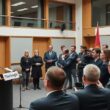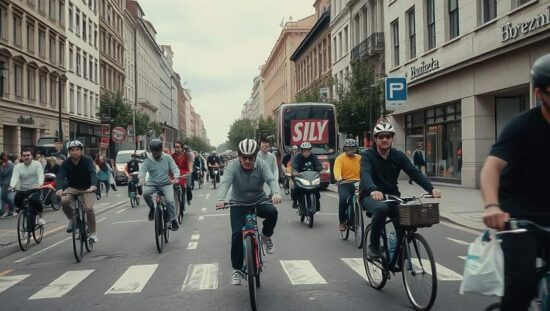A surge in cycling accidents and pedestrian incidents at traffic lights is prompting calls for urgent action to enhance road safety, with proposals ranging from mandatory helmet laws to a comprehensive review of traffic signal timings. Concerns are mounting over the vulnerability of cyclists and pedestrians, exacerbated by an aging population and the challenges faced by families and individuals with mobility issues.
Rudolph Scharping, honorary president of the German Cycling Federation (BDR), is advocating for a universal helmet requirement for cyclists, arguing it’s a crucial step in mitigating severe injuries during accidents. He further proposes intensified traffic education in schools and suggests a “Parking Marathon” – a concentrated police enforcement effort targeting illegal parking on secondary roadways – to raise driver awareness of the dangers posed by such violations. The initiative mirrors the recent “Speed Camera Marathon” implemented to curb speeding, highlighting a shift towards proactive deterrent measures.
The escalating concerns have been crystallized in a joint position paper released by Brandenburg’s and Thuringia’s Alternative for Germany (AfD) transportation ministers, Detlef Tabbert and Steffen Schütz. The paper, entitled “Initiative for Enhanced Road Safety through Extended Traffic Light Phases” calls for what they are terming an “Traffic Light Revolution”. They contend that current signal timings are dangerously short for pedestrians, posing a significant risk to vulnerable road users, especially the elderly, children, individuals with disabilities and parents with strollers. The ministers acknowledge the growing chorus of complaints regarding this perceived systemic flaw in German traffic policy.
Recognizing that the issue will likely intensify alongside Germany’s demographic shift towards an older population, the paper proposes prolonging pedestrian crossing times without creating increased congestion. To achieve this, the proposed extension of green light phases would be mirrored for drivers, theoretically minimizing the potential for traffic bottlenecks. The ministers are now pushing for this proposal to be formally added to the agenda of the next transportation ministers’ conference, signaling a determined effort to prioritize pedestrian safety and prompting a potentially significant debate within the German government. The ambitions reflect a political maneuver to present the AfD as champions of road safety, potentially leveraging public anxieties regarding pedestrian vulnerability.





